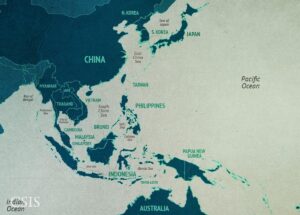Earlier this month the U.S. shot down a Chinese spy balloon after it crossed all of North America, lingering over military sites. It came down in U.S. territorial waters inside the 12-mile limit.
On the other side of the world, the U.S. routinely conducts military flights over the South China Sea. Some of these are reconnaissance missions. They stay within international airspace.
China claims 90% of the South China Sea as its “sovereign territory,” a claim not recognized by other nations, but to the Chinese these are U.S. spy flights over its territory. And that potentially sets up this scenario: they might think, “The U.S. shot down our spy balloon over their territory, so we’ll reciprocate by shooting down their spy plane over our territory.” The “our territory” being where the U.S. insists all nations are entitled to fly and sail.
The Chinese, of course, haven’t admitted their balloon was spying. They claim it was a “research” balloon, something akin to a weather balloon. This gives them an out, because if they feel it necessary to save face, they can reciprocate by shooting down an American weather or hobby balloon that drifted into their airspace. There probably are several to choose from at any given time.
So far the Chinese haven’t retaliated by shooting at a U.S. military plane, although they’ve aggressively harassing our planes (see story here). This restraint doesn’t spring from any acknowledgement of ambiguity with respect to their territorial claims. It’s practical geopolitics. Their reaction to the U.S. military presence in the South China Sea is governed by decisions in Beijing about when and how much they want to ratchet up tensions. China’s leaders want to keep this under their control.
China’s assertion of ownership of the South China Sea is a matter of geopolitics, too. It’s grounded far more in strategic considerations than their ostensible legal and historical arguments. From the map below, you can see China has no direct access to the world’s oceans; it has to go through the East and South China Seas.
For several centuries, seapower has ruled the world (see book here). As the book explains, China abrogated naval power and turned inward, at its cost. One of the costs was the British takeover of Hong Kong; another was the opium wars.
Today’s rulers of China are acutely aware of their country’s historical subjugation and humiliation by western powers, made possible and facilitated by western naval supremacy, and they won’t make that mistake again. China is rapidly building up its naval forces, including submarines and aircraft carriers.
But those Chinese naval forces can access the oceans only through narrow straits and passageways between islands controlled by other nations. That puts them at a strategic disadvantage. But even that’s not the whole story. Since the 1600s, there has been a global hegemon who imposed a world order. That position was contested among the Dutch, French, and British, with the latter emerging as the dominant power because of the Royal Navy’s supremacy on the high seas. Britain remained the global hegemon until the world wars, and since then the United States has been global hegemon, and the country that has maintained the global order.
There are American isolationists who would like our country to step away from that role. But if we did, someone else will step in, and the leading candidate is China, given that Russia is a landlocked state. Personally, I don’t think that’s a good idea, but maintaining our position as the “ruler of the waves” (and, by extension, the skies) requires a large and expensive military.
China doesn’t like America’s hegemony, and now understand the crucial role of seapower in world affairs. They’re building far more navy than they need to patrol their territorial waters and adjacent seas. They’re also partnering with Russia with the aim of creating a new world order in place of U.S. domination.
In short, they have big ambitions, and that explains their growing aggressiveness toward U.S. ships and planes operating in the South China Sea. It’s also because of these strategic considerations that the U.S. is increasing its forces there, and forging new alliances with the surrounding nations. China’s leaders, of course, see that as an effort to fence them in.
Against this backdrop, it’s not implausible that at some point China will raise the ante. First, they just told U.S. planes to “go away.” Now, they’re shadowing them with fighter jets. Recently, those jets are coming closer to our planes, in some cases threatening collision, trying to force our pilots to change course — and send a more threatening warning. Our posture is to assert a right to fly there. We’re not backing down (and shouldn’t).
The situation isn’t static, it’s gradually escalating, and at some point the Chinese may take it to the next level: Downing an American plane over what they consider “their sovereign territory.” They will say they didn’t do anything to us that we didn’t do to them first (their balloon). The first time this happens, both governments likely will shy away from labeling it an “act of war,” and try to contain the escalation by calling it a “misunderstanding.” Or the Chinese might even blame it on a “rogue” pilot or missile battery commander.
But the U.S. won’t leave the South China Sea, the Chinese won’t back down, and it will happen again. The second time it does there will be no denying that China and the U.S. are engaged in armed combat. And from there, things are far more likely to escalate than de-escalate.
And the downing of the spy balloon almost certainly will be the excuse the Chinese will use for starting a war they’re preparing for and believe is necessary to realize their global ambitions. The balloon could prove to be the 21st century equivalent of the Archduke gunned down in Sarajevo in a Europe that had already turned into a powderkeg. The parallels are downright eerie.
